- Clone
- Ba13 (See other available formats)
- Regulatory Status
- RUO
- Other Names
- CD200 R3, CD200RLb, OX-2 Receptor 3, CD200 receptor 3
- Isotype
- Rat IgG2a, κ
- Ave. Rating
- Submit a Review
- Product Citations
- publications
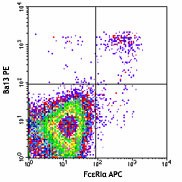
-

C57BL/6 peripheral blood leukocytes were stained with FcεRIα APC and CD200R3 (clone Ba13) PE (top) or rat IgG2a PE isotype control (bottom). Data shown were gated on lymphocyte population. -

| Cat # | Size | Price | Quantity Check Availability | Save | ||
|---|---|---|---|---|---|---|
| 142201 | 50 µg | 101 CHF | ||||
CD200R3, also known as CD200RLb and OX-2 Receptor 3, is a disulfide-linked dimeric CD200R-like receptor which belongs to immunoglobulin superfamily. Its positively charged amino acid lysine associates with ITAM- or YxxM motif-bearing adaptor molecules such as DAP12, DAP10, FcRγ, and CD3ζ. CD200R3 functions as an activating receptor to regulate IgE independent immune response.
Product DetailsProduct Details
- Verified Reactivity
- Mouse
- Antibody Type
- Monoclonal
- Host Species
- Rat
- Immunogen
- Mouse primary basophils
- Formulation
- Phosphate-buffered solution, pH 7.2, containing 0.09% sodium azide.
- Preparation
- The antibody was purified by affinity chromatography.
- Concentration
- 0.5 mg/ml
- Storage & Handling
- The antibody solution should be stored undiluted between 2°C and 8°C.
- Application
-
FC - Quality tested
- Recommended Usage
-
Each lot of this antibody is quality control tested by immunofluorescent staining with flow cytometric analysis. For flow cytometric staining, the suggested use of this reagent is ≤1.0 µg per million cells in 100 µl volume. It is recommended that the reagent be titrated for optimal performance for each application.
- Application Notes
-
Ba13 recognizes circulating and bone marrow basophils; it also recognizes a subset of mast cells in the peritoneal cavity and skin. Additional reported applications (for the relevant formats) include: stimulation of bone marrow derived basophils to produce IL-4.
- RRID
-
AB_10915969 (BioLegend Cat. No. 142201)
Antigen Details
- Structure
- Immunoglobulin superfamily; disulfide-linked dimer with positively charge amino acids in transmembrane; molecular weight is about ~38 kD or ~74 kD (reduced or non-reduced conditions, respectively)
- Distribution
-
Basophils in peripheral blood, bone marrow, spleen; mast cells in peritoneal cavity and skin
- Function
- Transduce stimulatory signals
- Interaction
- DAP12, DAP10, FcRγ, or CD3ζ
- Cell Type
- Basophils, Mast cells
- Biology Area
- Immunology, Inhibitory Molecules
- Molecular Family
- CD Molecules
- Antigen References
-
1. Voehringer D, et al. 2004. J. Biol. Chem. 52:54117.
2. Kojima T, et al. 2007. J. Immunol. 179:7093.
3. Sato K, et al. 2009. Blood 113:4780. - Gene ID
- 74603 View all products for this Gene ID
- UniProt
- View information about CD200R3 on UniProt.org
Related Pages & Pathways
Pages
Related FAQs
Other Formats
View All CD200R3 Reagents Request Custom Conjugation| Description | Clone | Applications |
|---|---|---|
| Purified anti-mouse CD200R3 | Ba13 | FC |
| PE anti-mouse CD200R3 | Ba13 | FC |
| APC anti-mouse CD200R3 | Ba13 | FC |
| TotalSeq™-A0809 anti-mouse CD200R3 | Ba13 | PG |
| PerCP/Cyanine5.5 anti-mouse CD200R3 | Ba13 | FC |
| PE/Cyanine7 anti-mouse CD200R3 | Ba13 | FC |
| Ultra-LEAF™ Purified anti-mouse CD200R3 | Ba13 | FC,Activ |
| TotalSeq™-B0809 anti-mouse CD200R3 Antibody | Ba13 | PG |
Compare Data Across All Formats
This data display is provided for general comparisons between formats.
Your actual data may vary due to variations in samples, target cells, instruments and their settings, staining conditions, and other factors.
If you need assistance with selecting the best format contact our expert technical support team.
-
Purified anti-mouse CD200R3
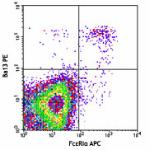
C57BL/6 peripheral blood leukocytes were stained with FcεRIα... 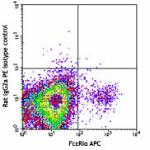
-
PE anti-mouse CD200R3

C57BL/6 peripheral blood leukocytes were stained with Fc&eps... 
-
APC anti-mouse CD200R3
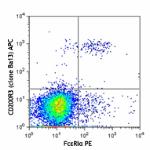
C57BL/6 mouse peripheral blood leukocytes were stained with ... 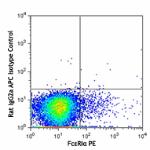
-
TotalSeq™-A0809 anti-mouse CD200R3
-
PerCP/Cyanine5.5 anti-mouse CD200R3

BALB/c mouse peripheral blood leukocytes were stained with F... -
PE/Cyanine7 anti-mouse CD200R3

BALB/c mouse peripheral blood leukocytes were stained with F... -
Ultra-LEAF™ Purified anti-mouse CD200R3
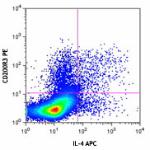
C57BL/6 bone marrow cell-derived basophils were stimulated w... 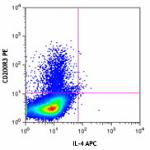
-
TotalSeq™-B0809 anti-mouse CD200R3 Antibody
 Login / Register
Login / Register 








Follow Us